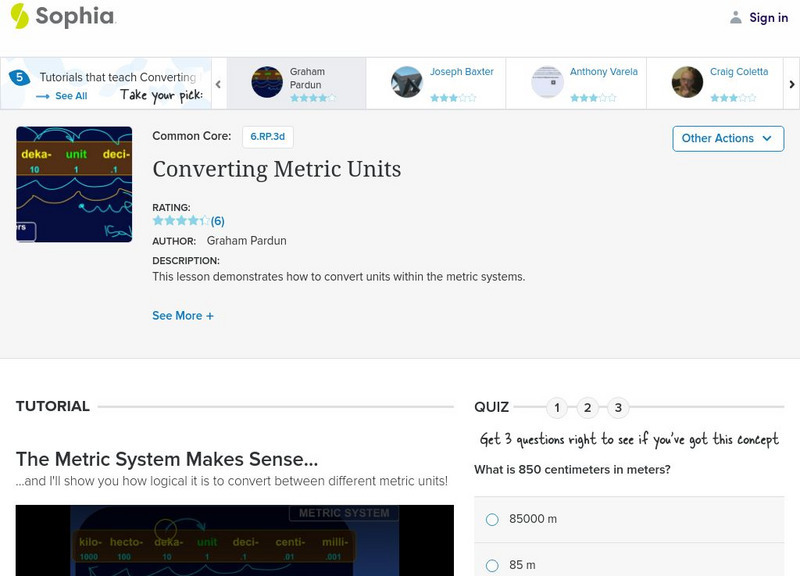Hi, what do you want to do?
Curated OER
Exploring a City from Space
In this exploring cities from space worksheet, students use a satellite image from the QuickBird Satellite to determine the image scale. They use the image scale to calculate the length of the Bellagio Hotel in Las Vegas, the length of a...
Curated OER
LRO's First Image of Mare Nubium
In this scale image worksheet, students use an image taken by the LRO satellite of Mare Nubium to determine the scale of the image, the diameter of the smallest crater and a comparison scale drawing of a house.
Curated OER
Proportionality, Ratios and Constant Variation
Young scholars use Scion Image to estimate the proportion of space images. In this proportion lesson, students investigate the online site of Image of the Orbitor and relate the dimensions and sizes to known sizes.
Curated OER
A Wet Welcome Home
Students investigate data collection and analysis. In this Algebra I lesson, students create a scatter plot and find the equation of best fit in a simulation of a leaking water pipe.
Curated OER
Let the Rain Come Down!
Second graders construct a bar graph comparing local precipitation to that of the Yucatan. For this graphing lesson, 2nd graders will use conversions and problem solving strategies.
Curated OER
Math: Road Trip
Twelfth graders use road maps to calculate the distance between two locations. They estimate the cost for fuel and the miles per gallon. They consider other factors such as geography, road conditions, and traffic that may impact the cost.
Curated OER
PLANETS IN PROPORTION
Students discover scales for both the solar bodies' relative sizes and their distances from the sun. They find equatorial circumference and volumes of their solar bodies. Students apply estimation strategies and proportioanl reasoning to...
Curated OER
Sea Ice: Cracking the Egg Code
Students study the egg code to learn about sea ice. In this sea ice lesson, students discuss and view a diagram to learn about the egg code when describing sea ice and its thickness. Students work in groups to play a game using the egg...
Curated OER
Understanding Celsius
Student read both Celsius and Fahrenheit temperatures on thermometers. They covert the temperatures and write poems to show understanding.
Curated OER
The Home Stretch
Students read the novel Stone Fox by John Reynold Gardiner. Using Lego RCX units, students build and program sleds to re-enact the "home stretch" of the National Dog Sled Race.
Curated OER
Egyptian Weather Lesson
Learners chart temperatures in Egypt on spreadsheet to determine how weather conditions affect lifestyles.
Curated OER
Explain Plant Chemical Processes
Students discover plant chemical processes through three lab activities. Overheads, data sheets, and teaching procedures provided for the unit covering photosynthesis, respiration, and transpiration.
Curated OER
Perimeter
Students explore the concept of perimeter. In this perimeter lesson plan, students discuss how to find perimeter of various shapes. Students use the Perimeter Explorer applet to find the perimeter of various shapes.
Curated OER
Reading Trees: Understanding Dendrochronology
Young scholars examine tree-ring dating and discuss the lack of water the settlers in Jamestown faced. They create paper tree rings, simulate rain patterns, and describe the history of construction paper tree sequences.
Curated OER
Reading distance on maps
Eighth graders complete worksheets on reading the distance on maps in miles or kilometers. In this maps lesson plan, 8th graders use a calculator and ruler.
Curated OER
Team Puzzles
Fourth graders work in co-operative teams of four to complete a puzzle. Each student initially works independently, and then the team jointly puts together the four shapes they have individually made, to complete the puzzle.
Curated OER
Squirt
Fourth graders using the idea of "how many more squirts" fill a container to develop multiplicative thinking. They also investigate the idea of conservation of volume when working with oddly shaped containers. They attempt to use...
Texas Education Agency
Texas Gateway: Converting Between Measurement Systems
Given a real-world situation with measurements in either metric/SI or customary units, the student will solve a problem requiring them to convert from one system to the other.
Sophia Learning
Sophia: Converting Metric Units
Determine how to convert measurements within the metric system. Assess understanding with a quiz.
Sophia Learning
Sophia: Converting Metric Units
Convert units using the metric system and assess learning with a quiz.
Annenberg Foundation
Annenberg Learner: Converting Metric Mass Units
Practice converting mass from one metric unit to another. Use your calculator if you need to.
Annenberg Foundation
Annenberg Learner: Converting Metric Volume
Practice converting volume from one metric unit to another. Use your calculator if you need to.
Math Is Fun
Math Is Fun: How to Convert Metric to Imperial
Simple steps and examples to help you convert metric measurements to Imperial units. Use a Metric - Imperial Conversion Chart as a reference.
Khan Academy
Khan Academy: Converting Units Word Problems (Metric)
In this exercise, students practice converting metric units in word problems. Students receive immediate feedback and have the opportunity to get hints and try questions repeatedly.




























